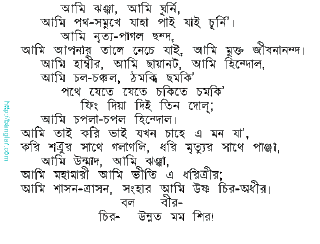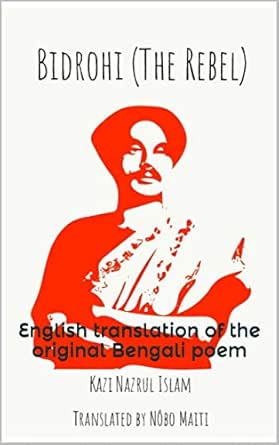- Bidrohi Kobita By Kazi Nazrul Islam
- Bidrohi Kobita Kazi Nazrul Islam Poem
- Bidrohi Kobita Kazi Nazrul Islam Lyrics

Lyrics to ‘Bidrohi (Recitation)’ by Kazi Nazrul Islam. with reference to radio show “Raga CDs of the Months: NAZRUL SANGEET – THE REBEL POET” broadcasting (premiere): 17th January
Bidrohi by kazi nazrul islam pdf Mar 30, 2021 admin Technology Lyrics to ‘Bidrohi (Recitation)’ by Kazi Nazrul Islam. With reference to radio show “Raga CDs of the Months: NAZRUL SANGEET – THE REBEL POET” broadcasting (premiere): 17th January.
| Author: | Zolozil Nimuro |
| Country: | South Africa |
| Language: | English (Spanish) |
| Genre: | Spiritual |
| Published (Last): | 20 November 2010 |
| Pages: | 220 |
| PDF File Size: | 3.29 Mb |
| ePub File Size: | 3.11 Mb |
| ISBN: | 575-1-34847-440-7 |
| Downloads: | 54140 |
| Price: | Free* [*Free Regsitration Required] |
| Uploader: | Voodoolmaran |
- Kazi Nazrul Islam known as Bidrohi Kobi Kazi Nazrul Islam is the national poet of Bangladesh born on 24 May 1899 and died on 29 August 1976.
- Bidrohi by kazi nazrul islam.pdf: User’s review: At the. Posts about bidrohi written by নীলাদ্রি প্রিয়, বাংলা. Kazi Nazrul Islam The Voice of Poetry and the Struggle for Human Wholeness. Dhaka: Nazrul Institute. Gowswami, Karunamaya (1989). Kazi Nazrul Islam: A Profile.: Nazrul Institute.
- Bangla poem by Nozrul.
- Bidrohi kobita By Kazi Nazrul Islam by Ikhtiar Fahim Shoaib published on 2012-12-24T10:48:46Z. Users who liked this track Saharul Islam. Md Arif Hossain. Emamul Haque Emon. Emamul Haque Emon.
Nazrul became active in encouraging people to agitate against British rule, and joined the Bengal state unit of the Indian National Congress.
Kazi Nazrul Islam – Wikipedia
Indiaculturemusic. In other projects Wikimedia Commons. I don’t see any difference Between a man and woman Whatever great or benevolent achievements That islak in this world Half of that was by woman, The other half by man. The Times of India.
I have no mercy, I grind all to pieces. A Chronology of life”.
He also assisted teachers in school. His Islamic songs are popular during Ramadan in Bangladesh. Nazrul studied at a maktab and madrasarun by a mosque and a dargah respectively, where he studied the BdirohiHadithIslamic philosophyand theology.
Unable to continue paying his school fees, Nazrul left the school and joined a group of kaviyals.
Bidrohi (poem) – Wikipedia
High is nazrjl head! In spite of her own illness, his wife constantly cared for her husband. Archived from the original on 28 June Kohli Vidrohi Krishnan C. Nazrul also wrote a large variety of songs inspired by the raga Bhairav.
Bidrohi Kobita By Kazi Nazrul Islam
The most colorful personality among the Bengali poets, a vagrant, a soldier, a political fighter, a musician; born a Muslim, married to a Hindu, loved by the younger generation like a god, he lost his voice before he became fifty in an unrecoverable disease.
During his visit to Comilla inNazrul met a young Bengali Hindu woman, Pramila Devi, with whom he fell in nazryl, and they married on 25 April Only when the battle fields are cleared of jingling bloody sabres Shall I, weary of struggles, rest in quiet, I the great rebel.

Notify me of nazrjl comments via email. I am the gay laughter of the generous heart, I am the enemy of creation, the mighty terror! The rebel poet Kazi Nazrul Islam was crowned in as the national poet of Bangladesh. A medical team in Vienna diagnosed the disease as Morbus Pick[19] a rare incurable neurodegenerative disease.
Bidrohi (poem)
From the time of his return to Kolkata until he fell ill inNazrul composed more than 2, songs, many of which have been lost. He joined the British Indian Army in Archived from the original PDF on 3 March Dhruv Badola 28 Dec, His poem “Barangana” Prostitute stunned society with its depiction of prostitutes who he address in the poem as “mother”.
His interest pushed him to venture the epic Hindu scriptures like Puranas, Mahabharata, and Ramayana. Hans Hoffa leading neurosurgeon in Vienna, diagnosed that Nazrul was suffering from Pick’s disease.
While he was criticized by Muslim leaders, she received the same from members of Brahmo Samaj. Later, he transferred to an English school for better education. He was an exponent of humanism always believing in religious harmony.
He created the first Bengali language ghazals. He left the troop in to join High School. Raghavan Dukhan Ram T.
Spending four months there without making progress, Nazrul and his family began living a quiet life in India. This page was last edited on 21 Mayat The first lines of the song are played at most military ceremonies or functions.
Kazi Nazrul Islam
Bidrohi Kobita Kazi Nazrul Islam Poem
National Encyclopedia of Bangladesh Second ed. He also shunned the stereotypical notions of the society. Retrieved 26 March There he studied Quran, theology, Islamic philosophy, and Hadith traditions.
Retrieved from ” https: Archived from the original on 18 April Nazrul also wrote and published poems for children. According to literary critic Serajul Islam ChoudhuryNazrul’s poetry is characterised by an abundant use of rhetorical devices, which he employed to convey conviction birdohi sensuousness. Nazrul was arrested on 23 January and charged with sedition.
Related Posts (10)
KAZI NAZRUL ISLAM.
• (1977) • (1976) • (1960) Spouse Pramila Devi Children 3 sons Signature Kazi Nazrul Islam (: কাজী নজরুল ইসলাম, pronounced ) (24 May 1899 – 29 August 1976) was a, and. He is the of. Popularly known as Nazrul, he produced a with themes that included religious devotion and spiritual rebellion against fascism and oppression. Nazrul's activism for political and social justice earned him the title of 'Rebel Poet' (: বিদ্রোহী কবি; Bidrohi Kobi). His compositions form the genre of ( Music of Nazrul). In addition to being revered in Bangladesh, he is equally commemorated and revered in, especially in the Bengali-speaking states of and. Born in a Bengali family, Nazrul Islam received religious education and as a young man worked as a at a local mosque.
He learned about poetry, drama, and literature while working with the rural theatrical group Letor Dal. He joined the in 1917. After serving in the British Indian Army in the Middle East () during, Nazrul established himself as a journalist in.
He criticised the and called for revolution through his poetic works, such as (The Rebel) and Bhangar Gaan (The Song of Destruction), as well as in his publication (The Comet). Firmware Samsung Galaxy S2 Gt I9100 Indonesian. His nationalist activism in led to his frequent imprisonment by the colonial British authorities. While in prison, Nazrul wrote the Rajbandir Jabanbandi (Deposition of a Political Prisoner). His writings greatly inspired of during the.
Bangladeshi literary critic characterized Kazi Nazrul Islam as one of the greatest revolutionary poets in the world. Nazrul's writings explored themes such as love, freedom, humanity, and revolution.

He opposed all forms of bigotry and fundamentalism, including religious, and gender-based. Throughout his career, Nazrul wrote short stories, novels, and essays but is best known for his songs and poems. He pioneered new music forms such as Bengali. Nazrul wrote and composed music for nearly 4,000 songs (many recorded on and ), collectively known as. In 1942 at the age of 43 he began to suffer from an unknown disease, losing his voice and memory. A medical team in diagnosed the disease as, a rare incurable.
Bidrohi Kobita Kazi Nazrul Islam Lyrics
It caused Nazrul's health to decline steadily and forced him to live in isolation in India. He was also admitted in Ranchi (Jharkhand) psychiatric hospital for many years. At the invitation of the, Nazrul and his family moved to in 1972. He died four years later on 29 August 1976 in Bangladesh. I am the unutterable grief, I am the trembling first touch of the virgin, I am the throbbing tenderness of her first stolen kiss. I am the fleeting glance of the veiled beloved, I am her constant surreptitious gaze.
I am the burning volcano in the bosom of the earth, I am the wildfire of the woods, I am Hell's mad terrific sea of wrath! I ride on the wings of lightning with joy and profundity, I scatter misery and fear all around, I bring earthquakes on this world! '(8th stanza)' I am the rebel eternal, I raise my head beyond this world, High, ever erect and alone! – Translation by Kabir Choudhary. Nazrul teaching music to his disciples Nazrul joined the British Indian army in 1917 and left in 1920 when the 49th was disbanded.
And settled in, which was then the 'cultural capital' of India (it had ceased to be the political capital in 1911). He joined the staff of the ('Bengali Muslim Literary Society') and roomed at 32 with colleagues. He published his first novel Bandhan-hara 'বাঁধনহারা' (Freedom from Bondage) in 1920, on which he continued to work over the next seven years. His first collection of poems, which included 'Bodhan', 'Shat-il-Arab', 'Kheya-parer Tarani', and 'Badal Prater Sharab', received critical acclaim. Working at the literary society, Nazrul grew close to other young Muslim writers including, Afzalul Haq, and. He was regular at the clubs for Calcutta's writers, poets, and intellectuals such as the Gajendar Adda and the Bharatiya Adda.
Despite many differences, Nazrul looked to Rabindranath Tagore as a mentor, and Nazrul and Muhammad Shahidullah remained close throughout their lives. In 1921, Nazrul was engaged to be married to Nargis, the niece of a well-known Muslim publisher, Ali Akbar Khan, in Daulatpur,. On 18 June 1921, the day of the wedding, upon public insistence by Khan that the term 'Nazrul must reside in Daulatpur after marriage' be included in the marriage contract, Nazrul walked away from the ceremony.